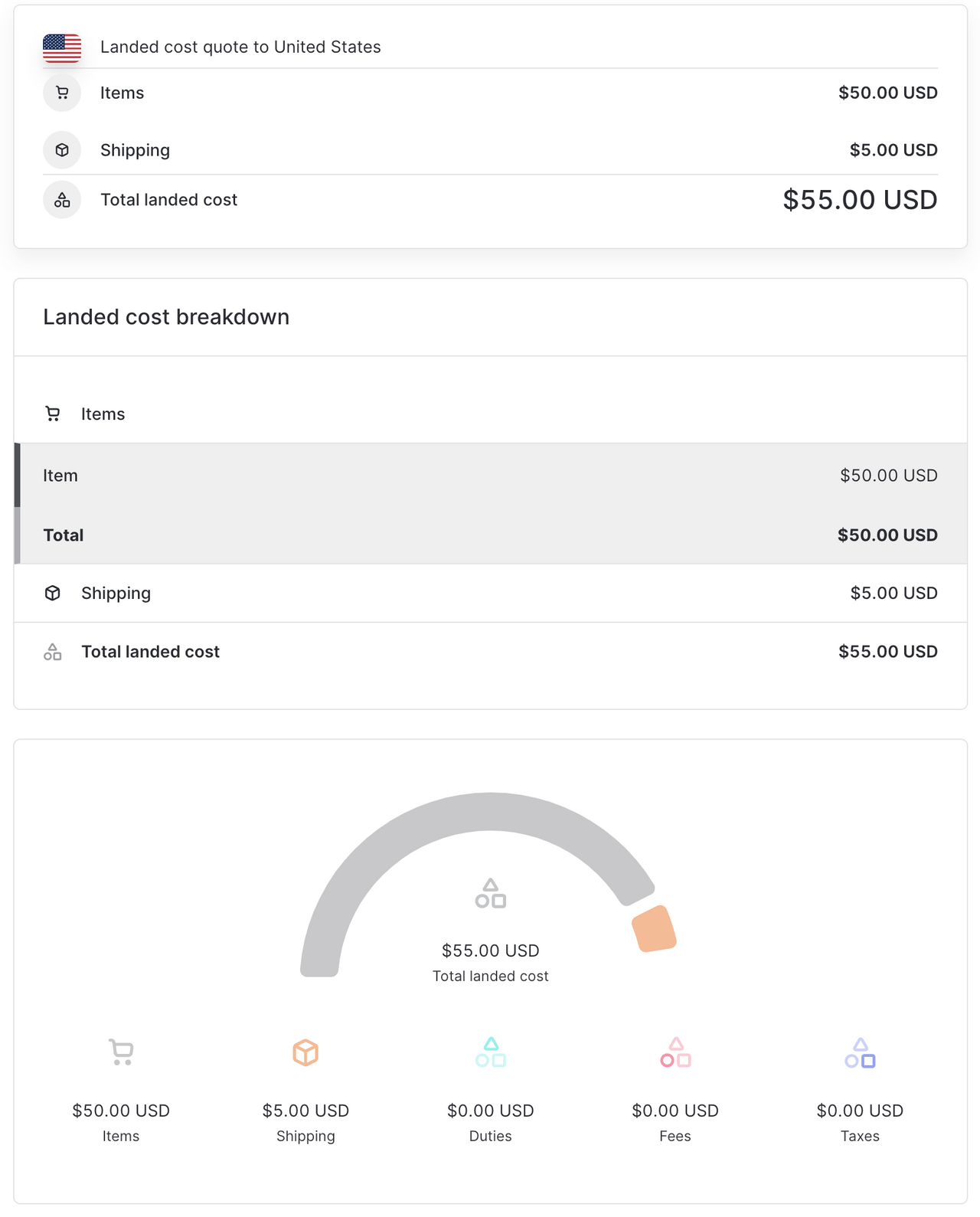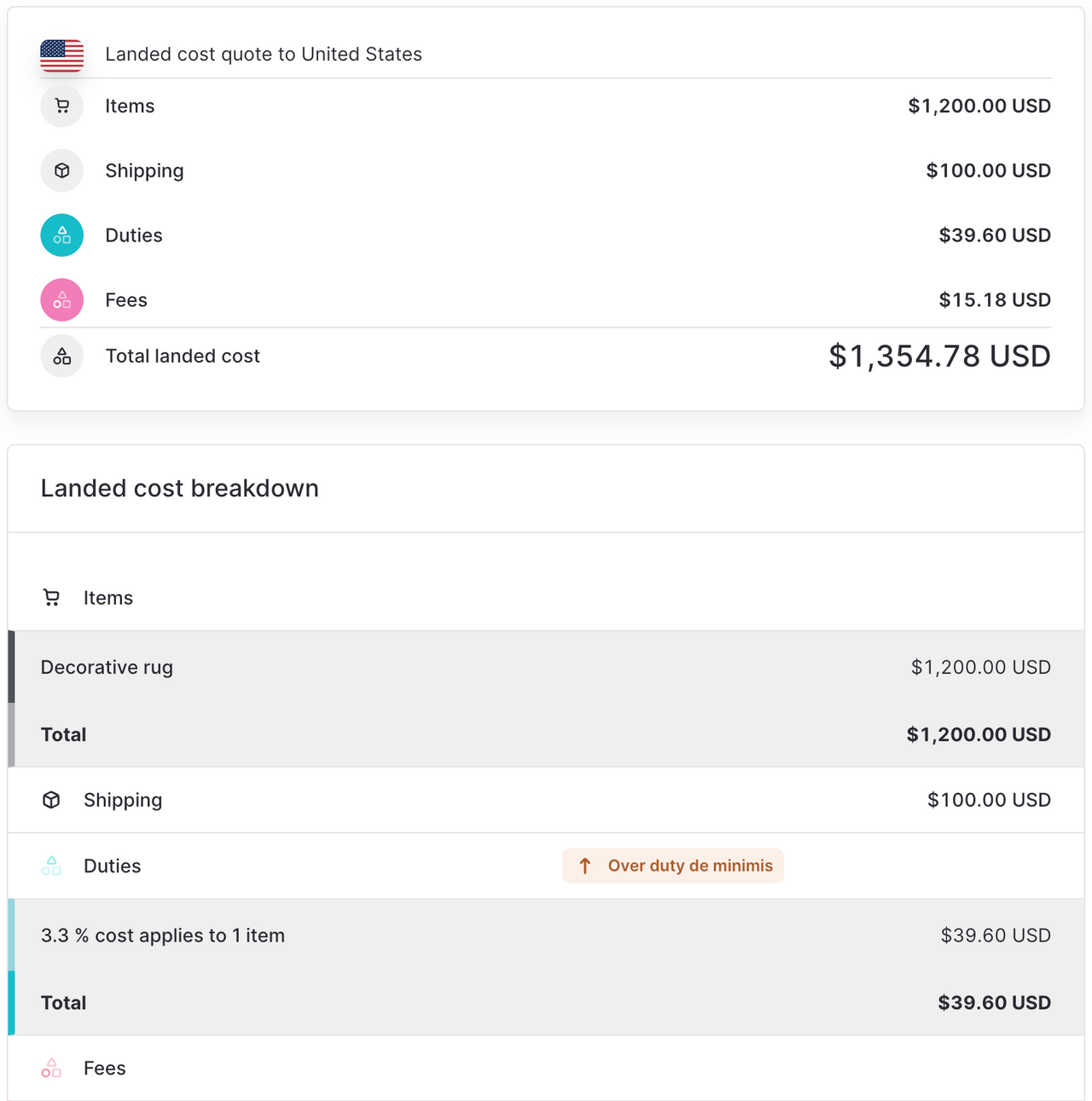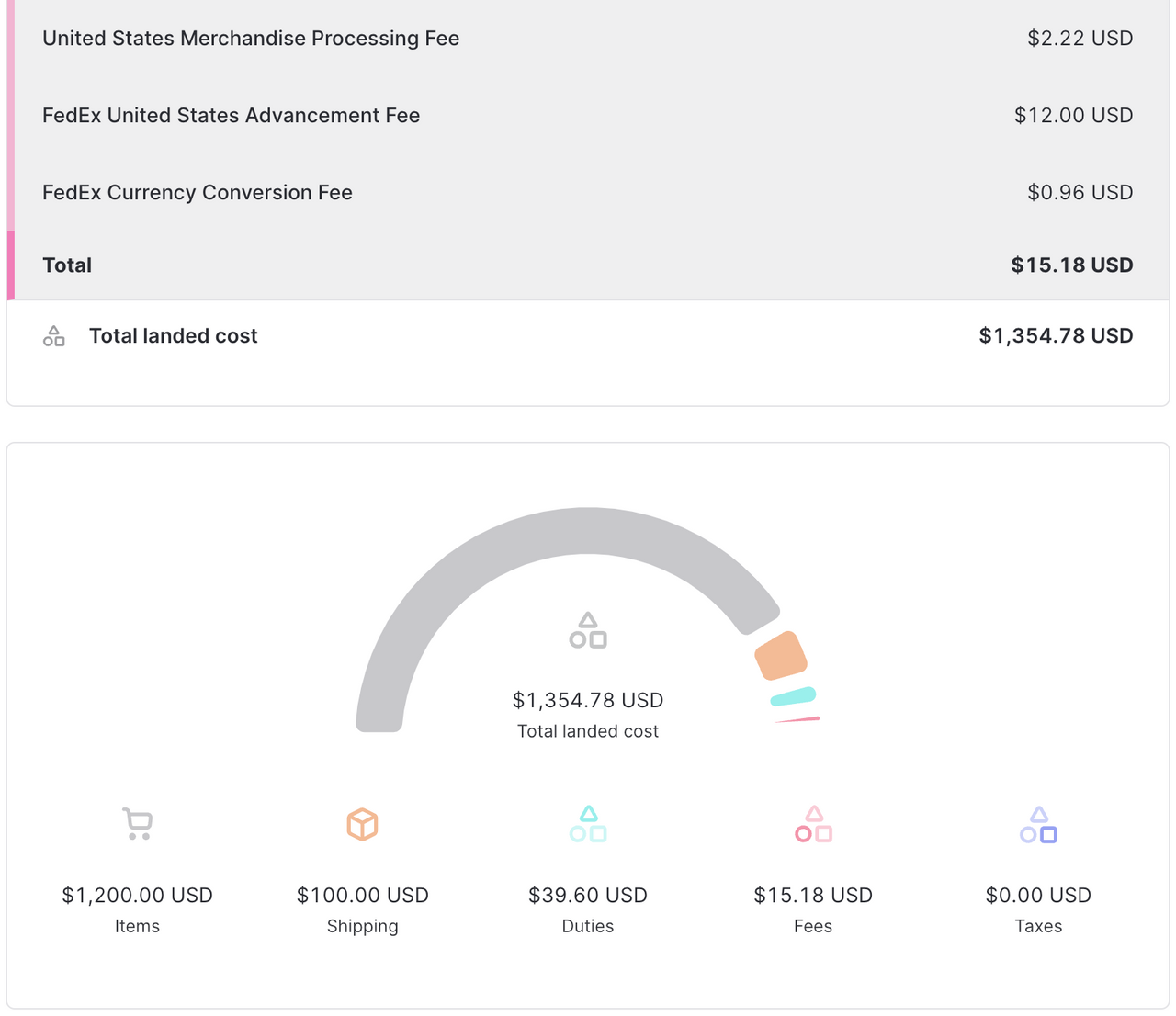Ease of importing goods score: A
Ease of doing business 5/5
- The U.S. is considered cross-border friendly due to its 14 trade agreements.
- The U.S. is the second-largest ecommerce market in the world.
Landed cost fairness 5/5
- The U.S. does not employ import taxes, and the average duty rate is low, which are both favorable factors for landed cost.
- The U.S. has a high de minimis value threshold, which is also favorable for landed cost.
Flexibility of legal regulations 4/5
- Customs and Border Protection (CBP) does not require sellers/importers to register for an import permit or license.
- Other government offices (FDA, FCC, etc.) may demand a license, permit, or other certification, based on the imported product(s).
Availability and accessibility of shipping 5/5
- There are many shipping services and carrier options due to the U.S.' large population (accounts for 4.25% of the worlds population (2020)), many of which are cross-border online shoppers.
Accessibility and variety of payment methods 5/5
- Available payment methods include VISA, Mastercard, American Express, ewallets, Discover, Apple Pay, PayPal, and Affirm.
Market opportunity 4/5
- The U.S. population and high percentage of internet users provide a potentially successful economy for retailers.
Key stats for the United States
| Population | 334.2 million (2022) |
| GDP | 23.4 trillion USD (2022) |
| GDP per capita | 75,180 USD (2022) |
| Internet penetration | 92 % of the population use the internet (2022) |
| Ecommerce users | 76% of the population shop online (2022) |
| Leading product categories | Books/music/video; computer and consumer electronics; toys and hobbies; and office equipment and supplies |
| Preferred online payment method(s) | Credit card, debit card, and online payment gateways |
| Languages | English |
| Currency | United States Dollar/USD/$ |
Landed cost for the U.S.
Landed cost is the total price of getting a purchase to the customer's door, which includes:
- Product price
- Shipping
- Duties
- Taxes
- Fees (currency conversion, carrier, broker, customs, or government fees)
The U.S. de minimis, tax, and duty
FOB: FOB (freight on board or free on board) is a valuation method for calculating import taxes where the tax is calculated only on the cost of the goods sold. Tax is not calculated on the shipping, duty, insurance, etc.
Further explanation of duty, tax, and de minimis is provided below
Duty and tax de minimis
- Duty and tax de minimis: 800 USD
Based on the FOB value of the import
De minimis value
Duty and tax will be charged only on imports into the U.S. where the total FOB value of the import exceeds the U.S. de minimum value threshold (de minimis), which is 800 USD. Anything under the tax de minimis value will be considered a tax-free import, and anything under the duty de minimis value will be considered a duty-free import.
Import tax
- Sales tax replaces import tax
Most U.S. states do have a sales tax, but rates vary by state.
Sales tax
In lieu of import tax, the U.S. has state-specific sales tax laws that apply to business-to-consumer shipments. Importers must be aware of these laws so they know when they need to pay taxes and if they need to self-report.
Most international, small-to-medium-sized businesses (SMB) will be exempt from paying sales tax on imported goods because they don’t have “nexus”, but these laws vary widely so it is important to do your due diligence to avoid issues with CBP.
What are the criteria for sales tax nexus?
Sales tax nexus exists when the online retailer has a connection with a state, or when the destination state has a stipulation that requires the seller to collect and remit sales tax directly to that state. All nexus laws vary by state. In general, nexus exists in the followng instances:
-
If you have a retail or storage location, an employee who resides or regularly travels there to conduct business.
-
When your sales into that state reach a state-specific threshold for self-disclosure and reporting of those sales.
- More information, on how U.S. sales tax affects international sellers.
If this applies to you, then you may be required to collect, report, and remit sales tax to your state.
What are the sales tax rates?
- Each state, county, city, or town can have a unique tax rate.
- In addition, sales tax is “destination-based.” This means that if you have sales tax nexus in a destination state, you must calculate the sales tax rate based on where your recipient is located.
What if my shopper says they are exempt?
If a U.S. retailer asks to be exempt from tax for wholesale reasons or because they are a tax-exempt charity, they will provide you with a government-issued tax-exempt number. You will need to save that number in your accounting records to avoid having to pay the tax, late fees, and penalties in the event of an audit.
Import duty
- Average duty rate: 5.63%
U.S. duty rates can be Ad Valorem (as a percentage of value) or specific (dollars/cents per unit)
Import duty
The value for duty on goods imported into the U.S. is based on the total purchase value of the article(s) paid and is not established on elements such as quality, size, or weight. The Harmonized Tariff System (HTS) determines duty rates for essentially every existing item. CBP uses the Harmonized Tariff Schedule of the United States Annotated (HTSUS), which is a reference manual that then provides the appropriate tariff rates for all goods imported into the U.S.
The U.S. duty charges (only applied if over the de minimis value) have a fairly wide range, so to get an accurate estimate of what the total landed cost will be, including duties, shipping, and carrier fees, use the Zonos Quoter.
Merchandise processing fee
U.S. imports over the 800 USD de minimis value may be subject to a merchandise processing fee (MPF).
- The MPF is applied to shipments that go through formal entry equal to or over a 2,500 USD value.
- Shipments with an informal entry are valued under $2500 and will receive an MPF of 2.22 USD.
- Shipments between 800 USD- 2500 USD will receive a nominal processing fee in the range of 2.22 USD-15 USD.
- The minimum MPF is 27.75 USD for formal entry imports
- The maximum MPF that can be added to a shipment is 528.33 USD.
Landed cost examples
Below are sample landed cost breakdowns for the U.S. calculated using Zonos Quoter. Since the tax de minimis is 0 USD, tax will always apply:
Landed cost for a shipment to the U.S. below the de minimis value:

Landed cost for a shipment to the U.S. above the de minimis value:


Trade agreements
The U.S. has at least 14 trade agreements that offer a zero or highly discounted duty rate for goods made in a participating country. The most prominent of these trade agreements is the USMCA.
The United States-Mexico-Canada Agreement USMCA
The USMCA agreement provides special duty rate treatment on shipments between the U.S., Mexico, and Canada. On July 1, 2020, USMCA replaced NAFTA (North American Free Trade Agreement), which was one of the oldest and most well-known trade agreements.
The USMCA allows for minimal formal entry procedures and saves consumers money, encouraging global trade as a result. USMCA offers substantial savings for merchants importing goods made in the U.S., Canada, or Mexico, that meet the rules of origin requirements.
Each country that is part of USMCA calls the agreement by their own name:
- In the United States: United States-Mexico-Canada Agreement (USMCA)
- In Mexico: Tratado entre México, Estados Unidos y Canadá (T-MEC)
- In Canada: Canada-United States-Mexico Agreement (CUSMA)
What this legislation means for the U.S.:
Courier shipments
- The de minimis value remains 800 USD.
- Any shipments under the de minimis value are exempt from duty fees.
- For imports under the 800 USD de minimis the goods must be sent from the US, Mexico, or Canada to receive preferential or duty-free treatment.
- For imports over the 800 USD de minimis a certain percentage of the goods components must be manufactured in the US, Mexico, or Canada. More details can be found here.
The U.S. is a member of the World Trade Organization
The U.S. is a member of the World Trade Organization (WTO). Therefore, the U.S. must abide by the most-favored-nation (MFN) clause, which requires a country to provide any concessions, privileges, or immunities granted to one nation in a trade agreement to all other WTO member countries. For example, if a country reduces duties by 10% for one country, the MFN clause states that all WTO members will have their duties cut by 10% into that country.
Customs resources
The U.S. Customs authority
U.S. Customs and Border Protection
Customs refund in the U.S.
Note: Talk to your carrier about customs refunds.
Shipping and compliance
Top courier services
- DHL Express
- FedEx
- UPS
- USPS
- OnTrac
Depending on the courier, additional shipping fees may include:
- Tracking
- Insurance
- Fuel surcharge
- Remote delivery charge
- Signature fee
- Overweight or oversized fee
- Special handling fee
- Dangerous goods fee
- etc.
Documentation and paperwork
Visit Common Export Documents to get detailed information concerning documentation and paperwork needed for U.S. export and imports
Restricted, prohibited, and controlled items
Government agencies regulate imports.
Restricted items are different from prohibited items. Prohibited items are not allowed to be imported into a country at all. Restricted items are not allowed to be imported into a country unless the importer has approval or a special license that allows them. Controlled goods have military or national security significance.
Prohibited items:
- Drugs and medicine prohibited by the FDA
- Distilled spirit absinthe
- Merchandise from embargoed countries
- Items made with dog and cat fur
- Counterfeit trademark and copyrighted articles
Restricted items:
- Health and beauty: nutritional and dietary supplements, medicine and drugs, cosmetics, dental instruments, veterinary products, medical items, and pharmaceuticals
- Contact lenses and eyewear
- Consumer electronics: CD-ROMs, CD players, computers with CD/DVD drives, microwave ovens, televisions with cathode ray tubes, and infrared products
- Chemicals
- Tobacco products
- Wood and wood products
- Animal products
- Firearms
- Certain food items
- Home and living: tableware
- Automobiles
- And more
Legal regulations for businesses
To lawfully enter the U.S., imported products must arrive inside the port of entry, delivery of the product must be approved by CBP, and assessed duties must be paid. The importer is liable for the analysis and delivery of the goods.
Tips for exporting from the U.S.
The International Trade Administration provides tools, assistance, and information on the requirements of exporting from the U.S. Depending on the goods or services, exporters may need a license or permit to export from the U.S. as a part of their business.
United States country guide
Learn about cross-border ecommerce, shipping, and importing.
If you are looking to grow your ecommerce business into the United States (U.S.) , you have come to the right place. Keep reading to learn everything you need to know about selling goods into the United States.
, you have come to the right place. Keep reading to learn everything you need to know about selling goods into the United States.